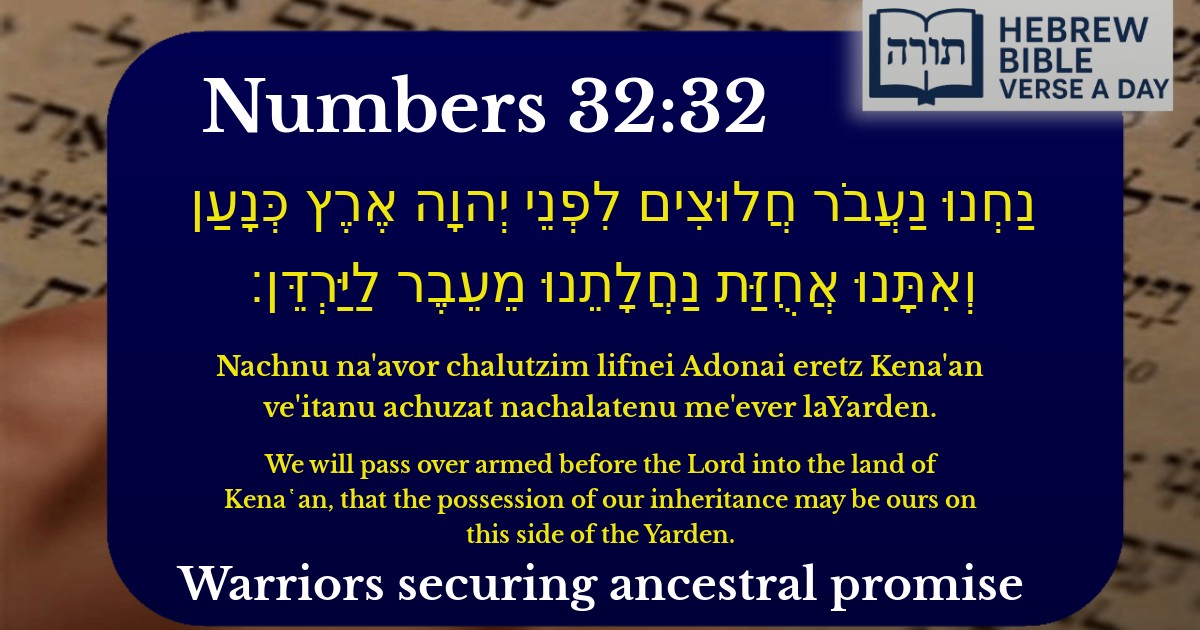Join Our Newsletter To Be Informed When New Videos Are Posted
Join the thousands of fellow Studends who rely on our videos to learn how to read the bible in Hebrew for free!
Hebrew Text
נַחְנוּ נַעֲבֹר חֲלוּצִים לִפְנֵי יְהוָה אֶרֶץ כְּנָעַן וְאִתָּנוּ אֲחֻזַּת נַחֲלָתֵנוּ מֵעֵבֶר לַיַּרְדֵּן׃
English Translation
We will pass over armed before the Lord into the land of Kena῾an, that the possession of our inheritance may be ours on this side of the Yarden.
Transliteration
Nachnu na'avor chalutzim lifnei Adonai eretz Kena'an ve'itanu achuzat nachalatenu me'ever laYarden.
Hebrew Leining Text
נַ֣חְנוּ נַעֲבֹ֧ר חֲלוּצִ֛ים לִפְנֵ֥י יְהֹוָ֖ה אֶ֣רֶץ כְּנָ֑עַן וְאִתָּ֙נוּ֙ אֲחֻזַּ֣ת נַחֲלָתֵ֔נוּ מֵעֵ֖בֶר לַיַּרְדֵּֽן׃
נַ֣חְנוּ נַעֲבֹ֧ר חֲלוּצִ֛ים לִפְנֵ֥י יְהֹוָ֖ה אֶ֣רֶץ כְּנָ֑עַן וְאִתָּ֙נוּ֙ אֲחֻזַּ֣ת נַחֲלָתֵ֔נוּ מֵעֵ֖בֶר לַיַּרְדֵּֽן׃
🎵 Listen to leining
Parasha Commentary
📚 Talmud Citations
This verse is quoted in the Talmud.
📖 Sotah 33b
The verse is referenced in a discussion about the tribes of Reuben and Gad's commitment to assist in conquering the land of Canaan before settling on the east side of the Jordan.


Context in the Torah
The verse (Bamidbar 32:32) is part of the dialogue between Moshe and the tribes of Reuven and Gad, who requested to settle on the eastern side of the Jordan River (Ever HaYarden). They assured Moshe that they would join the other tribes in conquering Eretz Canaan before returning to their allotted territory.
Phrase Analysis: "נַחְנוּ נַעֲבֹר חֲלוּצִים"
Rashi explains that "חֲלוּצִים" (chalutzim) means "armed" or "prepared for battle," derived from the root ח.ל.צ., indicating readiness. The tribes emphasized their commitment to fight alongside their brethren despite having their inheritance on the other side of the Jordan.
Spiritual Dimension: "לִפְנֵי יְהוָה"
The Sforno notes that "before Hashem" signifies that their participation in the conquest was not merely a military obligation but a divine mission. They recognized that the battle for Eretz Yisrael was under Hashem's guidance, as stated in the Torah (Devarim 20:4).
Inheritance and Unity
The Ramban highlights that the tribes stressed "אֲחֻזַּת נַחֲלָתֵנוּ" (our inheritance) to reassure Moshe they would not abandon their responsibility. The Midrash Tanchuma (Bamidbar 7) praises their commitment to unity, as they prioritized the collective need over personal convenience.
Halachic Implications